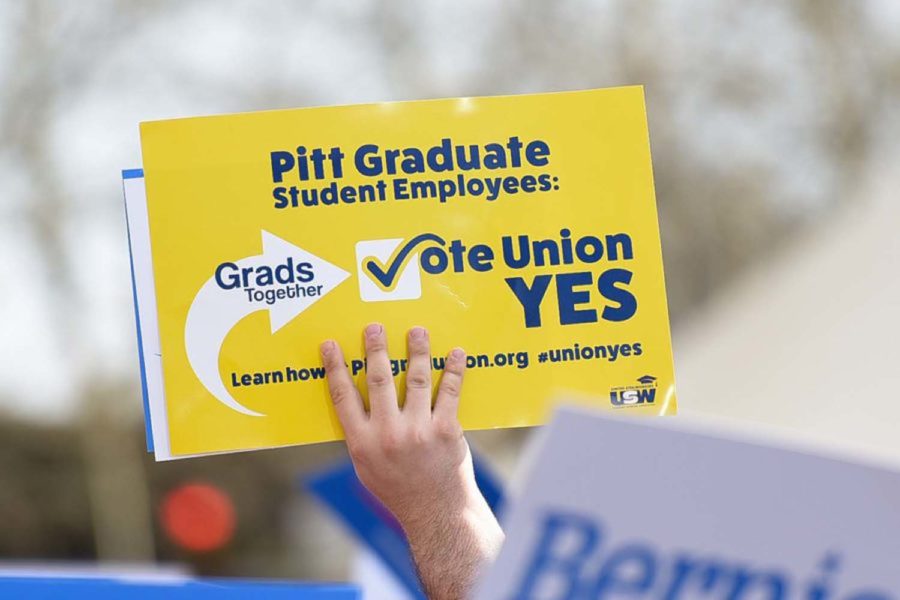Pitt grad union organizers, emboldened by labor wins across academia, escalate efforts
A Pitt graduate student union poster.
April 10, 2023
Graduate students at Yale, Johns Hopkins, Syracuse and several other major universities have unionized with more than 90% support in the last six months, sparking hope among organizers for a similar victory at Pitt.
“Since November, we’ve started to become a lot more aware of other graduate student unions nationally,” Alison Mahoney, a member of the organizing committee, said. “We’ve been really excited to see some incredible landslide victories at universities all over the place.”
A vote on whether to join the United Steelworkers, the union representing Pitt faculty, remains somewhat distant for graduate workers at the University. Organizers have yet to initiate a card campaign, a process by which 30% of the proposed bargaining unit must indicate their support for a union to prompt an election.
In preparation for a card campaign, organizers are trying to build support through tabling, office visits and other outreach methods.
“Our goal right now is we have 10,000 conversations and then we have a union,” organizing committee member Pat Healy said, echoing their comments from the fall. “It’s pretty simple, honestly.”
But the intensity of outreach efforts has ramped up since then — organizers have switched from tabling once to twice weekly — and the nature of conversations with graduate students has changed as well.
The recently resolved strike at Temple University has been front of mind for many graduate students, according to Healy.
Members of the Temple University Graduate Students’ Association voted nearly unanimously on March 9 to end a 42-day walkout and ratify a new collective bargaining agreement that includes pay raises, an updated grievance process and as well as expanded parental and bereavement leave.
“That reveals that there’s a power in this kind of structure,” Healy said. “Once we have this, it turns out it works really well.”
Healy also said the increased prevalence of face-to-face interaction has helped the union drive progress, though hybrid work continues to pose challenges. For example, Healy recently visited a department on a weekday morning to talk unionization with their colleagues only to find many offices empty.
“The remaining barriers tend to be the departments we can’t physically encounter,” Healy said. “If a given department has no community, has very little reason for folks to come into campus, it’s much harder for us to get to them to talk to them about the union.”
These factors — hybrid work and the ascendancy of organized labor in academia — make for a different environment compared to the last drive, which culminated in a narrow and controversial election defeat for union supporters in 2019.
The Pennsylvania Labor Relations Board found that the University had engaged in “coercive acts” that amounted to voter intimidation, including an email to 34 chemical engineering students by department chair Steven Little implying that the University was tracking who voted.
David Seldin, Pitt spokesperson at the time, told The Pitt News in March 2021 that the University’s actions throughout the election were “appropriate.”
The board ultimately concluded that the impact of this anti-union activity was insufficient to change the outcome of the election. The Steelworkers expressed intent to appeal to the Pennsylvania Commonwealth Court, but later withdrew its petition for further litigation.
“All workers, regardless of industry, deserve a seat at the table, and the USW remains committed to ensuring grad workers at Pitt have a chance to exercise their right to a free and fair union election,” USW spokesperson Jess Kamm said.
One thing that won’t dramatically impact the union’s chances of success, in Healy’s view, is the impending departures of Chancellor Patrick Gallagher and Provost Ann Cudd.
“We’re now in the middle of a labor movement that has these…elections that would make dictators jealous,” Healy said. “That is something I don’t think any University leadership can stop.”
Joan Gabel, who the Board of Trustees recently selected to replace Gallagher in July, said during an April 3 press conference she’s an “in-my-bones believer in shared governance.”
“Shared governance has always been foundational to the University of Pittsburgh,” a University spokesperson said. “The Graduate and Professional Student Government plays an important role alongside other governing bodies, and their input is vital to decisions about important initiatives, policies and regulations.”
Pitt declined to name the employee speaking on behalf of the University.
While Mahoney said she’s interested to see how the leadership shake-up will impact “administration’s ability to administrate,” she’s less concerned with who exactly is in charge.
“For me, they’re all just kind of interchangeable wealthy bosses, and an interchangeable wealthy boss is never going to have my best interest at heart,” Mahoney said.








